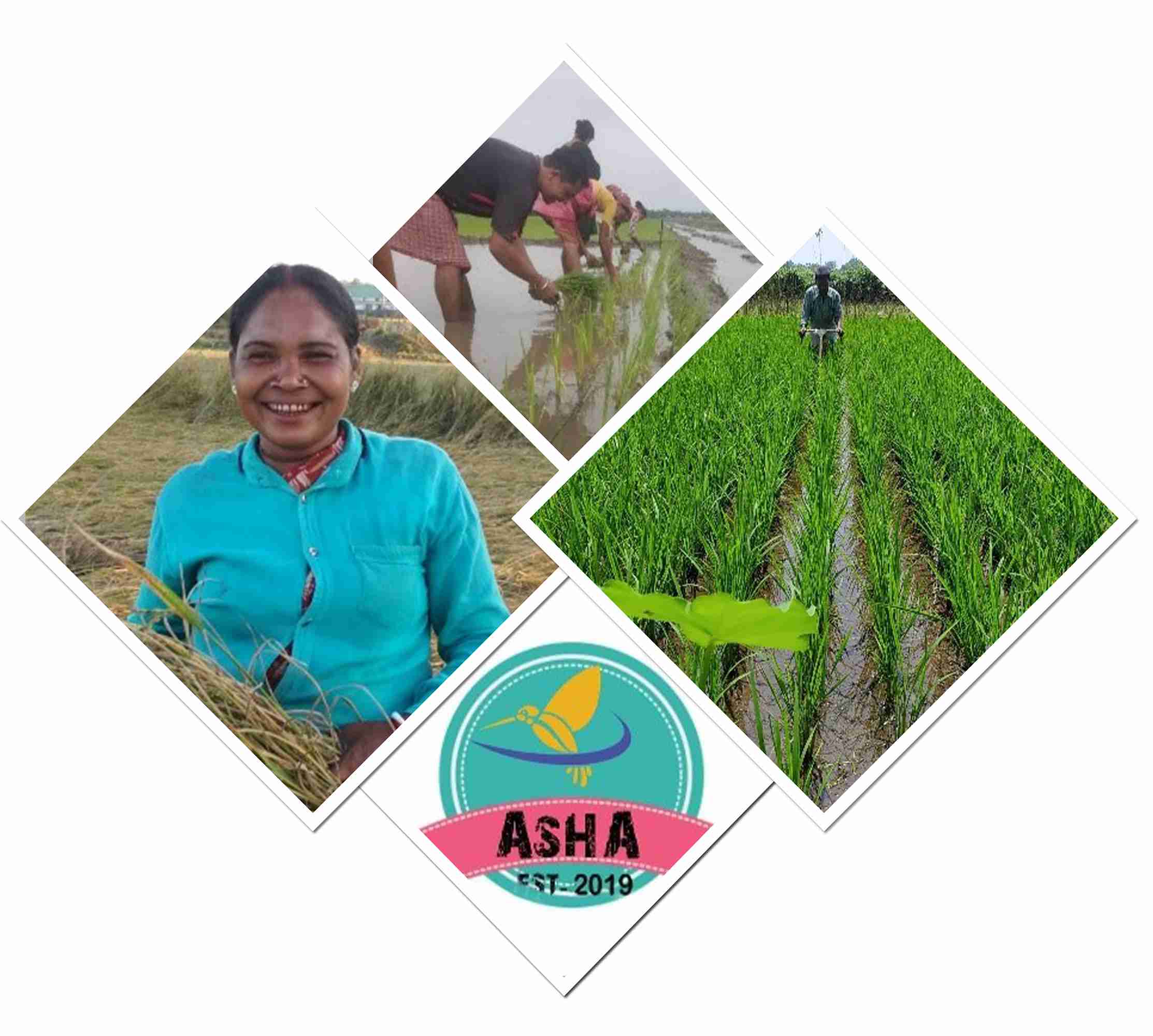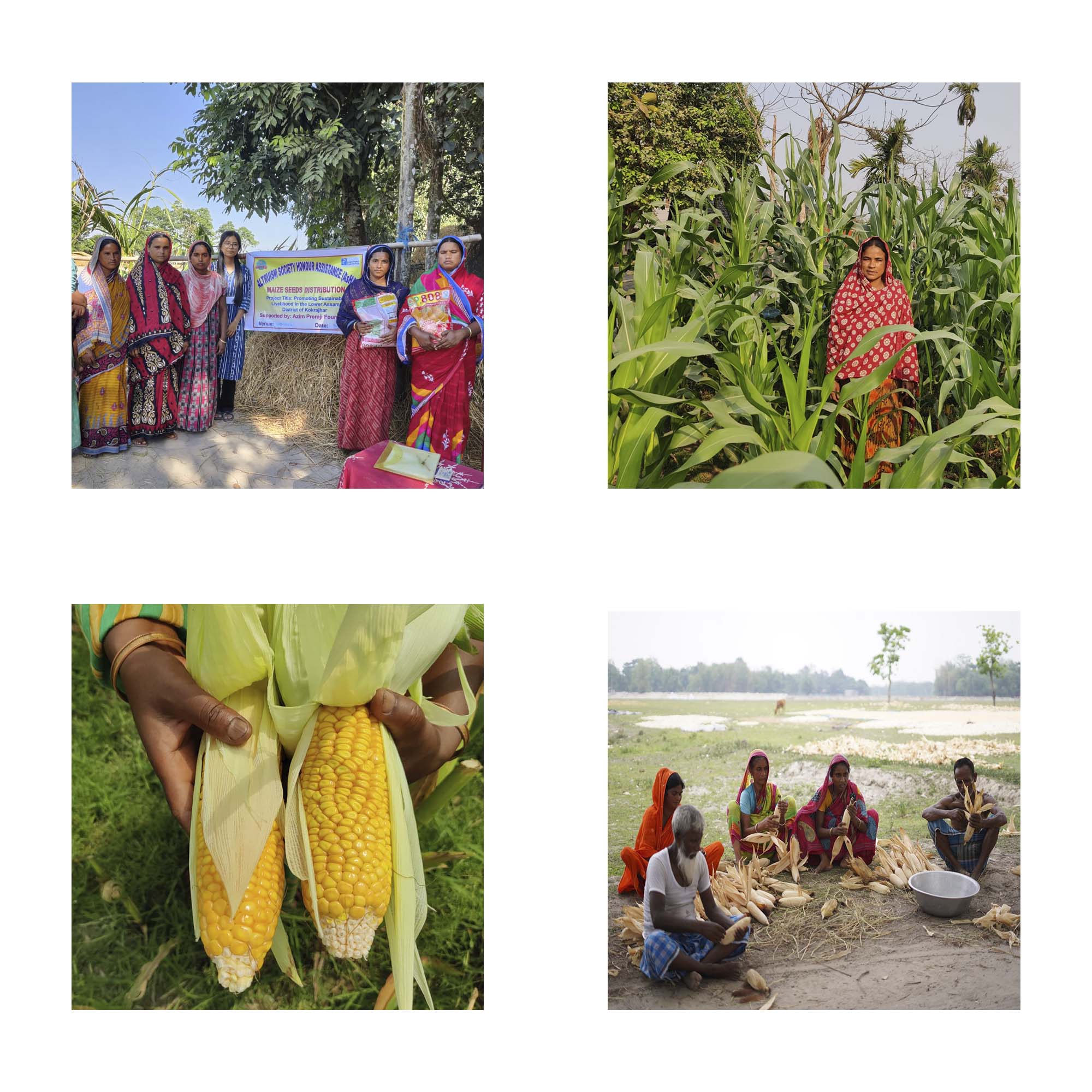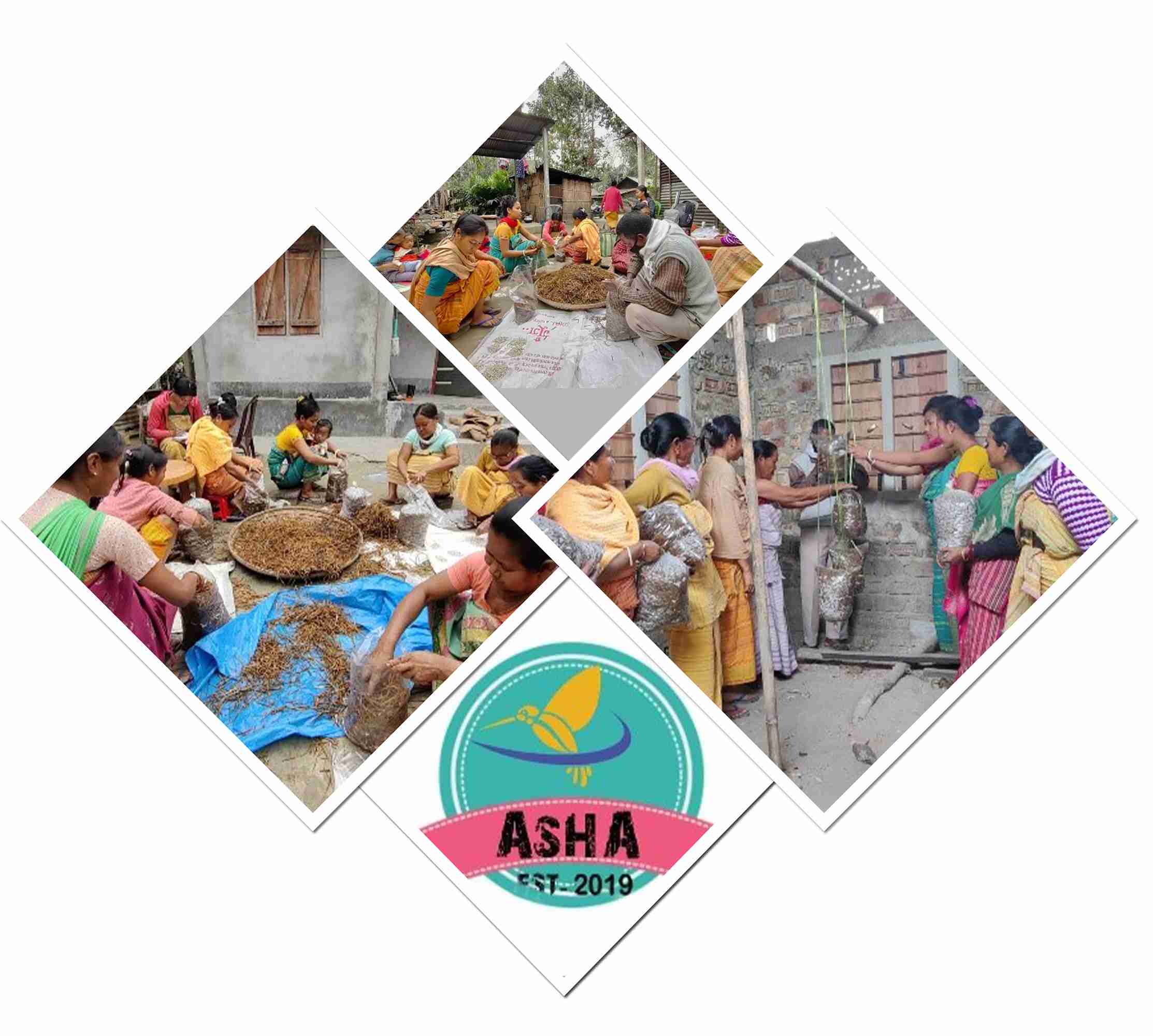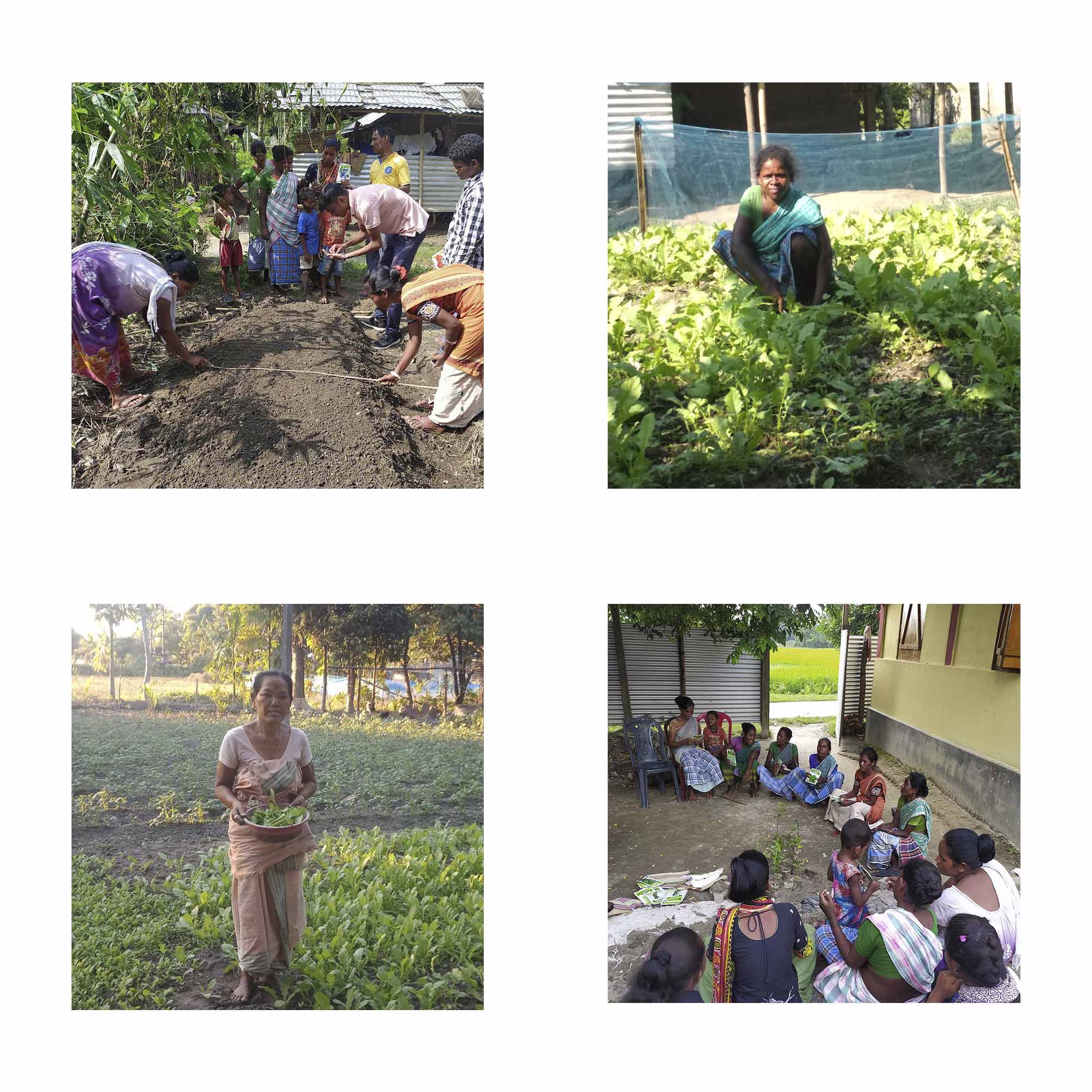Livelihood & Livestock
System of Rice Intensification
In Assam, where agriculture is the backbone of the economy, many small and marginal farmers struggle to produce enough food for their families throughout the year. Recognizing this challenge, AsHA has been working diligently to promote the System of Rice Intensification (SRI) among local communities. SRI isn’t just a fixed method but a holistic approach to farming, focusing on efficient resource management to boost rice productivity. By emphasizing techniques like organic manure use, careful nursery preparation, and strategic planting and irrigation, SRI aims to maximize yields from a smaller number of seeds. Through our efforts, we’ve successfully engaged 200 members of Self-Help Groups from Kachukata and Aminkata in adopting SRI principles. Our goal is clear: to enhance food security for these households while also increasing their income by Rs 10,000 through improved rice cultivation methods.

- Enhance the income of women beneficiaries through successful maize cultivation.
- Promote sustainability within the communities by fostering agricultural practices that contribute to long-term economic stability.
- Uplift SHGs by providing them with the resources and knowledge necessary to engage in profitable agricultural ventures.
 Mushroom Cultivation
AsHA facilitated a one-day on-field mushroom cultivation training session for the Mainao Self-Help Group (SHG) from Aminkata, underscoring our commitment to empowering local communities through skill development and sustainable livelihood opportunities. During the training, AsHA provided the SHG with essential materials such as plastic bags, rope, and mushroom seeds, ensuring they had the necessary resources to commence cultivation.
Moreover, we enlisted the expertise of a seasoned local trainer with extensive experience in mushroom cultivation. This trainer shared invaluable insights and practical techniques with the 10 women participants from the Mainao SHG, guiding them through the process of packing mushroom seeds into bags using straw. Through hands-on learning and collaborative effort, the participants gained valuable knowledge and skills essential for successful mushroom cultivation.
The provision of this training and support was made possible through the generous contributions from our fundraising efforts, reflecting our dedication to empowering SHGs and fostering sustainable development within the community.
Mushroom Cultivation
AsHA facilitated a one-day on-field mushroom cultivation training session for the Mainao Self-Help Group (SHG) from Aminkata, underscoring our commitment to empowering local communities through skill development and sustainable livelihood opportunities. During the training, AsHA provided the SHG with essential materials such as plastic bags, rope, and mushroom seeds, ensuring they had the necessary resources to commence cultivation.
Moreover, we enlisted the expertise of a seasoned local trainer with extensive experience in mushroom cultivation. This trainer shared invaluable insights and practical techniques with the 10 women participants from the Mainao SHG, guiding them through the process of packing mushroom seeds into bags using straw. Through hands-on learning and collaborative effort, the participants gained valuable knowledge and skills essential for successful mushroom cultivation.
The provision of this training and support was made possible through the generous contributions from our fundraising efforts, reflecting our dedication to empowering SHGs and fostering sustainable development within the community.
 Nutrition Garden
AsHA has also motivated women from the SHGs to prepare nutrition garden in their small homestead land. As more than 80% people live in villages, however not every family have ample amount of agricultural land, people mostly have only homestead land. They depend on daily wage work throughout the year. During off season they find it difficult to find work and thus it becomes difficult for them to meet the daily food supply requirement. As they are also unskilled they do not have access of income through other income generating activities, the eating habit changes and the nutrition intake becomes very low. The effect of malnutrition becomes high in children.
Thus, to bring some changes in the food intake, AsHA has taken initiative help farmers in nutrition garden so that they get enough nutrition from the food and also act as a form of alternate livelihood where they can sell the extra vegetable from their garden and use the money for other expenses. This also helps them in making them aware about the source of their food, and teach them valuable gardening and agriculture concept and skill.
Land holding for each beneficiary (SHG members) is around 0.25 bigha or less. The processes of Nutrition Garden such as land preparation, spacing, transplantation, use of manure were done through on field training.
Nutrition Garden
AsHA has also motivated women from the SHGs to prepare nutrition garden in their small homestead land. As more than 80% people live in villages, however not every family have ample amount of agricultural land, people mostly have only homestead land. They depend on daily wage work throughout the year. During off season they find it difficult to find work and thus it becomes difficult for them to meet the daily food supply requirement. As they are also unskilled they do not have access of income through other income generating activities, the eating habit changes and the nutrition intake becomes very low. The effect of malnutrition becomes high in children.
Thus, to bring some changes in the food intake, AsHA has taken initiative help farmers in nutrition garden so that they get enough nutrition from the food and also act as a form of alternate livelihood where they can sell the extra vegetable from their garden and use the money for other expenses. This also helps them in making them aware about the source of their food, and teach them valuable gardening and agriculture concept and skill.
Land holding for each beneficiary (SHG members) is around 0.25 bigha or less. The processes of Nutrition Garden such as land preparation, spacing, transplantation, use of manure were done through on field training.
 LIVESTOCK PROGRAM
In our ongoing efforts to improve livestock welfare and reduce animal mortality rates, our team has taken a holistic strategy that addresses numerous areas of animal husbandry. Recognising the prevalence of traditional techniques of animal rearing in the communities with which we work, our initial efforts concentrated on mobilising the community and exposing them to scientific livestock management approaches. We introduced a discussion with community members by participating in Self-Help Group (SHG) and Village Organisation (VO) meetings to emphasise the need of implementing modern methods for enhanced animal health and productivity.
One of the key interventions implemented was the construction of animal sheds to protect livestock from adverse weather conditions. These shelters play an important role in ensuring the animals’ well-being by providing a safe habitat for growth and development. Following the building of these shelters, separate piggery and goatery training programmes were implemented. A experienced resource person from Gossaigaon’s veterinary department guided these sessions. Participants were educated on a variety of topics, including animal health management, disease detection, preventative techniques, and suitable feeding practices required to ensure the animals’ general health and growth.
In a recent significant accomplishment, a vaccination effort was organised in Aminkata village to target the pig population. Professionals from the veterinary department assisted in carrying out the vaccination campaign. This programme gave pigs with necessary immunisations to protect them against common infections, considerably lowering the risk of illness and mortality. Notably, what distinguishes this vaccine campaign is the significant transformation in community views towards accepting such treatments. Initially met with scepticism and resistance, community members who were previously unwilling to accept vaccination for their animals now enthusiastically endorse and engage in such initiatives. This transformation might be credited to the training programmes that raised awareness among community members about the health benefits of vaccination.
In conclusion, our efforts in the livestock improvement project have yielded significant progress in enhancing the well-being of animals within the communities we serve. Through strategic interventions such as shed construction, training programs, and vaccination drives, we have not only imparted valuable knowledge but also fostered a positive shift in attitudes towards modern practices of animal husbandry. Moving forward, we remain committed to continuing our collaborative efforts with the community, leveraging education, and outreach to further improve livestock health and ultimately contribute to the sustainable development of the region.
LIVESTOCK PROGRAM
In our ongoing efforts to improve livestock welfare and reduce animal mortality rates, our team has taken a holistic strategy that addresses numerous areas of animal husbandry. Recognising the prevalence of traditional techniques of animal rearing in the communities with which we work, our initial efforts concentrated on mobilising the community and exposing them to scientific livestock management approaches. We introduced a discussion with community members by participating in Self-Help Group (SHG) and Village Organisation (VO) meetings to emphasise the need of implementing modern methods for enhanced animal health and productivity.
One of the key interventions implemented was the construction of animal sheds to protect livestock from adverse weather conditions. These shelters play an important role in ensuring the animals’ well-being by providing a safe habitat for growth and development. Following the building of these shelters, separate piggery and goatery training programmes were implemented. A experienced resource person from Gossaigaon’s veterinary department guided these sessions. Participants were educated on a variety of topics, including animal health management, disease detection, preventative techniques, and suitable feeding practices required to ensure the animals’ general health and growth.
In a recent significant accomplishment, a vaccination effort was organised in Aminkata village to target the pig population. Professionals from the veterinary department assisted in carrying out the vaccination campaign. This programme gave pigs with necessary immunisations to protect them against common infections, considerably lowering the risk of illness and mortality. Notably, what distinguishes this vaccine campaign is the significant transformation in community views towards accepting such treatments. Initially met with scepticism and resistance, community members who were previously unwilling to accept vaccination for their animals now enthusiastically endorse and engage in such initiatives. This transformation might be credited to the training programmes that raised awareness among community members about the health benefits of vaccination.
In conclusion, our efforts in the livestock improvement project have yielded significant progress in enhancing the well-being of animals within the communities we serve. Through strategic interventions such as shed construction, training programs, and vaccination drives, we have not only imparted valuable knowledge but also fostered a positive shift in attitudes towards modern practices of animal husbandry. Moving forward, we remain committed to continuing our collaborative efforts with the community, leveraging education, and outreach to further improve livestock health and ultimately contribute to the sustainable development of the region.

